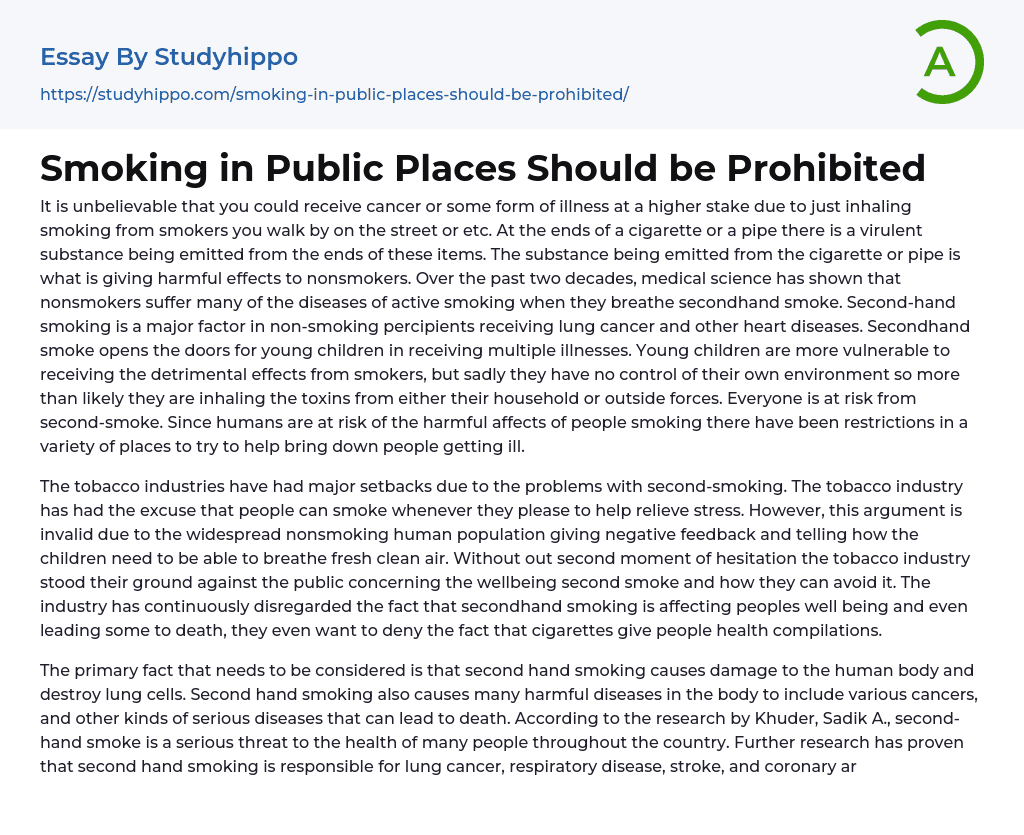

Smoking in Public Places Should be Prohibited Essay Example
It is difficult to fathom that just by breathing in smoke from people who smoke outdoors or elsewhere, one's chances of getting cancer or other illnesses can increase. The harmful substance emitted into the air by the ends of cigarettes or pipes has detrimental effects on non-smokers. Studies conducted over the last two decades have revealed that non-smokers face comparable health problems to those who actively smoke when they are exposed to secondhand smoke.
Secondhand smoke is a major contributor to lung cancer and heart diseases among individuals who do not smoke. Additionally, it poses a risk to young children who are particularly vulnerable to the detrimental effects of smoking. Regrettably, children have no control over their surroundings and may inhale harmful substances from their residences or other external origins. Overall, secondhand smoke jeopardizes the well-being of all individuals, leading to numerous reg
...ulations in various locations that aim to diminish illnesses associated with smoking. Consequently, concerns regarding secondhand smoke have presented challenges for tobacco industries.
Despite the widespread outcry from the nonsmoking public about the negative effects of secondhand smoke on their health and the wellbeing of children, the tobacco industry has consistently used the excuse that people have the freedom to smoke whenever they want to relieve stress. However, this argument holds no weight as it has failed to address the concerns raised by the general population. The industry has continuously ignored the fact that secondhand smoking not only affects people's well-being but can also lead to death. Additionally, they aim to discredit the notion that cigarettes are responsible for health complications.
The tobacco industry disregards public concern over secondhand smoke's impact on health and child welfare
using personal freedom as an excuse for smoking under stress. Yet, this argument fails as it neglects addressing raised concerns while ignoring how secondhand smoking leads to both harm and possible fatality. Furthermore, their intent is to undermine cigarettes' responsibility for health issues.
Research conducted by Khuder, Sadik A. confirms that second-hand smoking is a major cause of damage to the human body and destruction of lung cells, leading to serious diseases such as cancer and other fatal conditions. This study highlights the significant threat to individuals' health posed by second-hand smoke across the country.
In addition, various studies have shown that second-hand smoking is responsible for illnesses such as lung cancer, respiratory disease, stroke, and coronary artery diseases. In the United States alone, it has resulted in approximately 4,900 deaths. The severity of this issue is further emphasized by a chart provided by the researcher depicting the occurrence of different diseases among states.
The health effects of smoking are significant, as states with more smokers have higher death rates and more diseases. Conversely, states with fewer smokers have lower death rates and fewer diseases. Moreover, nonsmokers generally report fewer illnesses. In addition, secondhand smoking is linked to coronary heart disease. It is worth considering whether the consequences of secondhand smoke also endanger the natural environment.
Despite the widespread awareness of the detrimental effects of smoke inhalation on human health, its impact on the environment is frequently overlooked. Smoking cigarettes can lead to substantial pollution, particularly air pollution. Smokers often assert their human rights by insisting on smoking in any location they desire. While it is valid that individuals possess the freedom to make both positive and negative decisions,
it is crucial to take into account the adverse repercussions of smoking for one's own well-being and the environment.
Nonsmokers have the right to breathe clean air and avoid the health risks associated with second-hand smoke. Research indicates that a brief exposure to smoke does not result in death. In order to promote peace, improve overall health, and extend lifespans, it is crucial for our society to implement laws that ban smoking in public places. To summarize, the U.S. government should officially prohibit second-hand smoke based on these convincing reasons.
Recognizing the substantial danger that second-hand smoke poses to human health, as well as its negative effects on animals and the environment, it is crucial to implement a comprehensive ban on public smoking. This measure aims to protect individuals who are internally exposed to smoke by prioritizing public safety and prohibiting smokers from smoking in any areas where non-smokers may be present. Non-smokers should have the right to breathe clean air without worrying about potential health problems caused by second-hand smoke.



